PI: Amanda Larracuente
Graduate Students: Emiliano Martí, Logan Edvalson, Jabale Rahmat, Leila Lin
Research associates and technicians: Danna Eickbush, Nick Fuda, Josiah Bowers
Undergraduates: Adya Mohapatra, Tyler Handler, Artemis Shung, Gabrielle Nemer, Daniel Lee
Former lab members
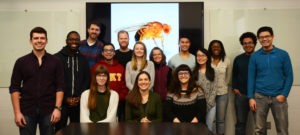
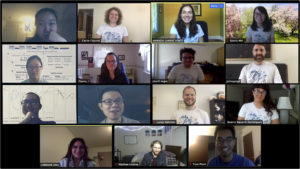
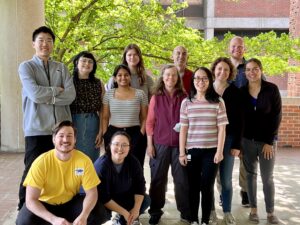
Lab members:
Amanda Larracuente, Ph.D. (PI, Nathaniel and Helen Wisch Professor of Biology)
e-mail: alarracu@bio.rochester.edu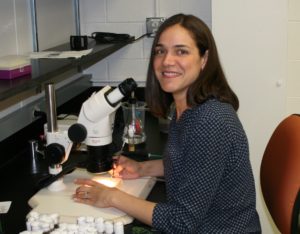
Amanda earned her Ph.D. studying Drosophila genomics and sex chromosome evolution in Dr. Andrew Clark’s lab at Cornell University. During her postdoctoral training, she focused on the evolution of selfish DNA including the Segregation Distorter system of Drosophila melanogaster. Amanda was the Stephen Biggar and Elisabeth Asaro Fellow in Data Science from 2017-2020. She became the Nathaniel and Helen Wisch Professor of Biology in 2024. Amanda is the Associate Chair of the Biology Department.
Other roles: Amanda is the advisor and track coordinator for the undergraduate major and minor in Computational Biology. She teaches the Applied Genomics capstone for comp bio majors. Amanda is also an active member of the Goergen Institute for Data Science where she advised majors and MS students and co-chairs the working group in Life and Biomedical Data Science. Outside of the University, she is on the editorial boards for Molecular Biology and Evolution and GENETICS and was on the Board of Directors for the Genetics Society of America.
Selected publications from before starting the lab. Click here for a full list of Amanda’s publications or see her NCBI bibliography and ORCID.
- Larracuente, A.M. 2014. The organization and evolution of the Responder satellite in species of the Drosophila melanogaster group: dynamic evolution of a target of meiotic drive. BMC Evol. Biol.14:233. doi:10.1186/s12862-014-0233-9
- Larracuente, A.M. and A.G. Clark. 2014. Recent selection on the Y-to-dot translocation in Drosophila pseudoobscura. Mol. Biol. Evol. 31(4):846-856. doi 10.1093/molbev/msu002.
- Larracuente, A.M. and A.G. Clark. 2013. Surprising differences in the variability of Y chromosomes in African and Cosmopolitan populations of Drosophila melanogaster. Genetics. 193:201-214.
- Larracuente, A.M. and D.C. Presgraves. 2012. The selfish Segregation Distorter gene complex of Drosophila melanogaster. Genetics. 192: 1-21.
Graduate students
Emiliano Martí (E2G2 graduate student)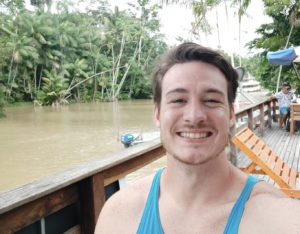
Emiliano got his masters at the Sao Paulo State University studying the evolution of repetitive DNA in Schistocerca grasshoppers. He is interested in repetitive elements and their role in genome organization and sex chromosome evolution. Emiliano joined the Larracuente lab as an E2G2 graduate student, and is studying the organization of satellite DNA in populations. He is co-advised by Dr. Daven Presgraves. Learn more about Emiliano’s research on his website http://non-mendelian.com.
Selected Publications:
Martí, E. and A.M. Larracuente. 2025. An innovation in host responses to escalating genomic conflicts. Trends in Genetics. https://doi.org/10.1016/j.tig.2025.03.001.
Martí, E. and A.M. Larracuente. 2023. Genetic conflict and the origin of multigene families: implications for sex chromosome evolution. Proc R. Soc. B. https://doi.org/10.1098/rspb.2023.1823.
Martí, E, Milani, D, Bardella, V.B. Albuquerque, L., Song, H.,Palacios-Gimenez,O.M. and D.C. Cabral-de-Mello. 2021. Cytogenomic analysis unveils mixed molecular evolution and recurrent chromosomal rearrangements shaping the multigene families on Schistocerca grasshopper genomes. Evolution 75-8: 2027–2041. doi:10.1111/evo.14287
Logan Edvalson (CDM graduate student)
Logan completed his masters at Brigham Young University developing tools to study the evolutionary developmental genetics of reptiles. He is broadly interested in how genetic conflicts shape the evolution of the genome and how these conflicts influence chromatin architecture. Logan joined the Larracuente lab as a CDM graduate student in Spring 2023.
Selected publications:
Edvalson, L. T. and A.M. Larracuente. 2025. Consequences of drive on the evolution of genomes and species. G3: Genes|Genomes|Genetics DOI:10.1093/g3journal/jkaf076.
Jabale Rahmat (E2G2 graduate student)
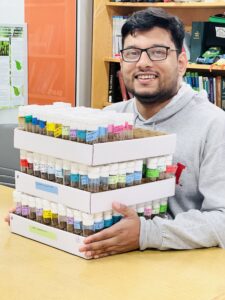
Jabale completed his BS in Biochemistry from IndependentUniversity, Bangladesh and his MS in Biology from Miami University in Ohio, where he studied the underlying molecular mechanism of wing evolution in insects. Jabale loves to work with fruit flies! “They are such a beautiful model organism to work with. ” Jabale is interested in chromosome biology, especially the role of repetitive elements in genomic conflicts, organization, and evolutionary dynamics.
Leila Lin (E2G2 graduate student)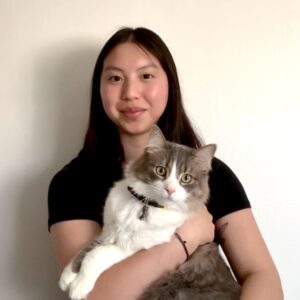
Leila completed her undergraduate studies at the University of California, Irvine, where she investigated signatures of positive selection in genes associated with heterochromatin function across Drosophila species and explored their relationship with repetitive genomic content. Broadly, she is interested in how repetitive elements contribute to genome organization and chromosome evolution. In Spring 2025, Leila joined the Larracuente Lab as an E2G2 student, where she plans to investigate chromosome domain organization.
Research associates and technicians
Danna Eickbush, Ph.D. (Research associate)
e-mail: danna.eickbush@rochester.edu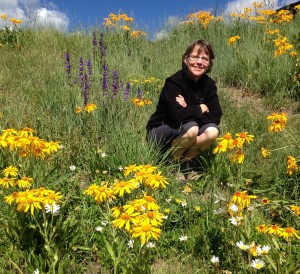
Danna Eickbush attended the University of Arizona where she was introduced to the wonders of molecular biology and immediately transferred to the newly formed Department of Cellular and Development Biology. She then joined the Ph.D. program in Cellular and Development Biology at Harvard University, characterizing the molecular structure and transcriptional patterns of the 71C-E region of Drosophila melanogaster while in the lab of Dr. Peter Cherbas. After moving to upstate New York, she did a postdoc with Dr. Jack Werren studying the selfish B-chromosome Paternal Sex Ratio (PSR) in the wasp Nasonia vitripennis. For the last 25 years, she has worked as a research associate with Dr. Tom Eickbush at the University of Rochester. The long tenure with her husband allowed Danna to study many aspects of the life cycle of the retrotransposable element R2, including its regulation and transcription. Danna works on the regulation of satellite DNA expression in Drosophila species.
Selected recent publications. Click here to see Danna’s PubMed list.
- Eickbush, T.H. and Eickbush, D.G. 2015. Integration, regulation, and long-term stability of R2 retrotransposons. In Mobile DNA III. ASMscience. Editor Nancy L. Craig (in Press).
- Eickbush, D.G., Burke, W.D. and Eickbush, T.H. 2013. Evolution of the R2 retrotransposon ribozyme and its self-cleavage site. PLoS One 8: e66441.
- Eickbush, D.G. and Eickbush, T.H. 2012. R2 and R2/R1 hybrid non-autonomous retrotransposons derived by internal deletions of full-length elements. Mobile DNA 3: 10.
Nick Fuda, Ph.D. (Research associate)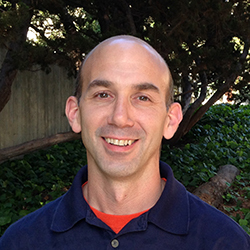
e-mail: nfuda@UR.Rochester.edu Nick Fuda received his PhD from John Lis’ lab at Cornell University in 2012. He investigated general mechanisms of RNA polymerase II transcription in Drosophila melanogaster with a particular interest in the mechanisms controlling promoter-proximal pausing. As a post-doc, he studied dosage compensation in Caenorhabditis elegans in Barbara Meyers’ lab at University of California Berkeley, investigating how the dosage compensation machinery specifically localizes to the X chromosome and how RNA polymerase II transcription is being modulated to compensation X chromosome expression. Nick is now studying the molecular mechanisms of meiotic drive as a research associate in the lab.
Selected Publications:
Fuda NJ, Guertin MJ, Sharma S, Danko CG, Martins AL, Siepel A, Lis JT. GAGA factor maintains nucleosome-free regions and has a role in RNA polymerase II recruitment to promoters. PLoS Genet. 2015 Mar 27;11(3):e1005108. doi:10.1371/journal.pgen.1005108
Duarte FM, Fuda NJ, Mahat DB, Core LJ, Guertin MJ, Lis JT. Transcription factors GAF and HSF act at distinct regulatory steps to modulate stress-induced gene activation. Genes Dev. 2016 Aug 1;30(15):1731-46. doi: 10.1101/gad.284430.116
Nicholas J Fuda, Katjuša Brejc, William S Kruesi, Edward J Ralston, Rachel Bigley, Aram Shin, Miki Okada, Barbara J Meyer Combinatorial clustering of distinct DNA motifs directs synergistic binding of Caenorhabditis elegans dosage compensation complex to X chromosomes. Proc Natl Acad Sci USA 2022 Sep 13;119(37):e2211642119. doi: 10.1073/pnas.2211642119
Josiah Bowers (Technician)
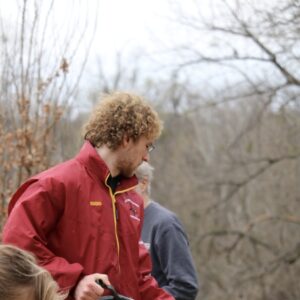
Josiah received his BS in Biochemistry and Philosophy from St. John Fisher University. He is our lab fly wrangler and also contributes to our study of the mechanisms of Segregation Distorter in Drosophila melanogaster.
Undergraduates
Adya Mohapatra (undergraduate, Molecular Genetics)
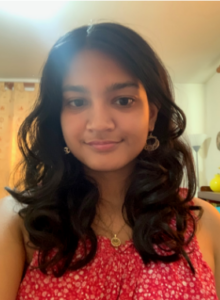
Adya is an undergraduate majoring in molecular genetics who is using CRISPR to delete satellite DNA in Drosophila melanogaster.
Tyler Handler (undergraduate, Molecular Genetics)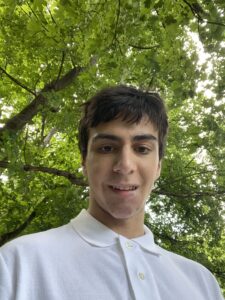
Tyler is an undergraduate majoring in molecular genetics with a minor in computational biology. He is mapping a suppressor of Segregation Distorter in Drosophila melanogaster.
Artemis Shung (undergraduate, Computational Biology)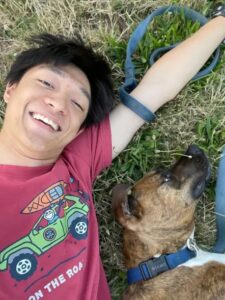
Artemis is an undergraduate majoring in computational biology. He is part of our team “Spermatogenomics” and is currently satellite DNA transcription in D. melanogaster testes.
Gabrielle Nemer (undergraduate, Computational Biology)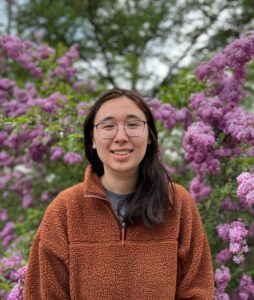
Gabby is an undergraduate majoring in computational biology. She is part of our team “Spermatogenomics” and is currently chromatin landscapes in D. melanogaster testes.
Daniel Lee (undergraduate, Computational Biology)
Daniel is an undergraduate majoring in computational biology. He is part of our team “Spermatogenomics” and is currently chromatin landscapes in D. melanogaster testes.
